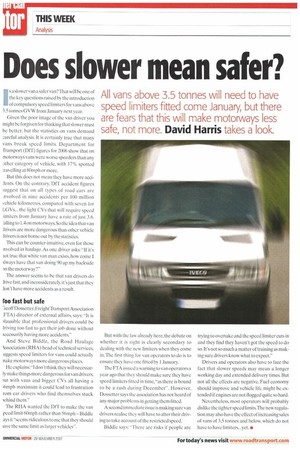Does slower mean safer?
Page 24

If you've noticed an error in this article please click here to report it so we can fix it.
All vans above 3.5 tonnes will need to have
speed limiters fitted come January, but there are fears that this will make motorways less safe, not more. David Harris takes a look.
Is a slower van a safer van?That will be one of the key questions raised by the introduction of compulsory speed limiters for vans above 3.5 tonnes GVW from January next year.
Given the poor image of the van driver you might be forgiven for thinking that slower must be better, but the statistics on vans demand zareful analysis. It is certainly true that many vans break speed limits. Department for Transport (MT) figures for 2006 show that on motorways vans were worse speeders than any ather category of vehicle. with 17% spotted travelling at 80m ph or more.
But this does not mean they have more accilents. On the contrary. DfT accident figures iuggest that on all types of road ears are nvolved in nine accidents per 100 million vehicle kilometres, compared with seven for LGVs... the light CVs that will require speed imiters from January have a rate of just 3.6. :ailing to 1.4 on motorways. So the idea that van irivers are more dangerous than other vehicle 'rivers is not borne out by the statistics.
This can be counter-intuitive, even for those nvolved in haulage. As one driver asks: "if it's lot true that white van man exists, how come I ilways have that van doing 90 up my backside m the motorway?"
The answer seems to be that van drivers do Irive fast, and inconsiderately-, it's just that they lon't have more accidents as a result, rim fast but safe 71eoff Dosset t el% Freigh Transport Association IFTA) director of external affairs, says: "It is )1ausible that professional drivers could be 'riving too fast to get their job done without tecessarily having more accidents."
And Steve Biddle, the Road Haulage kssociation (R HA ) head of technical services. uggests speed limiters for vans could actually nake motorways more dangerous places.
He explains:"I don't think they will necessarly make things more dangerous for van drivers, mt with vans and bigger CVs all having a ifimph maximum it could lead to frustration rom ear drivers who find themselves stuck )ehind them."
The RHA wanted the DfT to make the van peed limit 60mph rather than 56mpli— Biddle ays it "seems ridiculous to me that they should lave the same limit as larger vehicles". But with the law already here, the debate on whether it is right is clearly secondary to dealing with the new limiters when they come in. The first thing for van operators to do is to ensure they have one fitted by 1 January.
The FTA issued a warning to van operators a year ago that they should make sure they have speed limiters titled in time,"as there is bound to be a rush during December". However. Dossetter says the association has not heard of any major problems in getting them fitted.
A second immediate issue is making sure van drivers realise they will have to alter their driving to take account of the restricted speed.
Biddle says: "There are risks if people are trying to overtake and the speed limiter cuts in and they find they haven't got the speed to do so. It's not so much a matter of training as making sure drivers know what to expect."
Drivers and operators also have to face the fact that slower speeds may mean a longer working day and extended delivery times. But not all the effects are negative. Fuel economy should improve and vehicle life might be extended if engines are not flogged quite so hard.
Nevertheless, most operators will probably dislike the tighter speed limits.The new regulation may also have the effect of increasing sales of vans of 3.5 tonnes and below, which do not have to have limiters...yet. •






















































































































































































